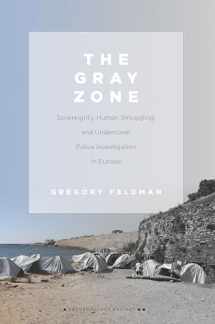
The Gray Zone: Sovereignty, Human Smuggling, and Undercover Police Investigation in Europe (Anthropology of Policy)
ISBN-13:
9781503607651
ISBN-10:
1503607658
Edition:
1
Author:
Gregory Feldman
Publication date:
2019
Publisher:
Stanford University Press
Format:
Paperback
240 pages
Category:
Forensic Science
,
Criminal Law
,
Emigration & Immigration
,
Social Sciences
,
Cultural
,
Anthropology
,
Sociology
FREE US shipping
on ALL non-marketplace orders
Marketplace
from $2.99
USD
Marketplace offers
Seller
Condition
Note
Seller
Condition
Used - Like New
Book details
ISBN-13:
9781503607651
ISBN-10:
1503607658
Edition:
1
Author:
Gregory Feldman
Publication date:
2019
Publisher:
Stanford University Press
Format:
Paperback
240 pages
Category:
Forensic Science
,
Criminal Law
,
Emigration & Immigration
,
Social Sciences
,
Cultural
,
Anthropology
,
Sociology
Summary
The Gray Zone: Sovereignty, Human Smuggling, and Undercover Police Investigation in Europe (Anthropology of Policy) (ISBN-13: 9781503607651 and ISBN-10: 1503607658), written by authors
Gregory Feldman, was published by Stanford University Press in 2019.
With an overall rating of 4.5 stars, it's a notable title among other
Forensic Science
(Criminal Law, Emigration & Immigration, Social Sciences, Cultural, Anthropology, Sociology) books. You can easily purchase or rent The Gray Zone: Sovereignty, Human Smuggling, and Undercover Police Investigation in Europe (Anthropology of Policy) (Paperback) from BooksRun,
along with many other new and used
Forensic Science
books
and textbooks.
And, if you're looking to sell your copy, our current buyback offer is $0.3.
Description
Based on rare, in-depth fieldwork among an undercover police investigative team working in a southern EU maritime state, Gregory Feldman examines how "taking action" against human smuggling rings requires the team to enter the "gray zone", a space where legal and policy prescriptions do not hold. Feldman asks how this seven-member team makes ethical judgments when they secretly investigate smugglers, traffickers, migrants, lawyers, shopkeepers, and many others. He asks readers to consider that gray zones create opportunities both to degrade subjects of investigations and to take unnecessary risks for them. Moving in either direction largely depends upon bureaucratic conditions and team members' willingness to see situations from a variety of perspectives. Feldman explores their personal experiences and daily work in order to crack open wider issues about sovereignty, action, ethics, and, ultimately, being human. Situated at the intersection of the EU migration apparatus and the global, clandestine networks it identifies as security threats, this book allows Feldman to outline an ethnographically-based theory of sovereign action.


We would LOVE it if you could help us and other readers by reviewing the book
Book review

Congratulations! We have received your book review.
{user}
{createdAt}
by {truncated_author}


